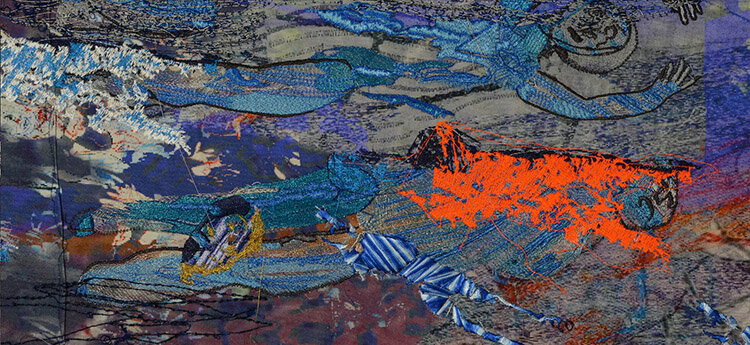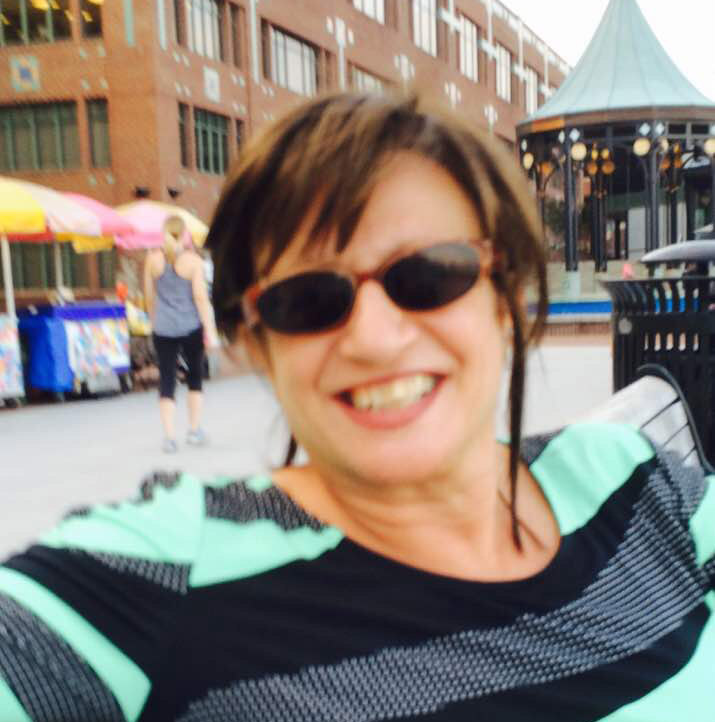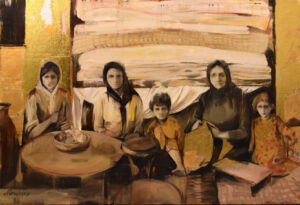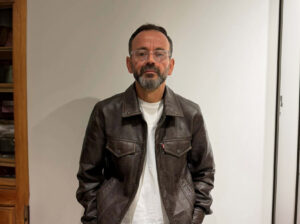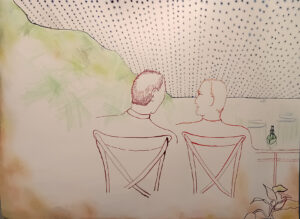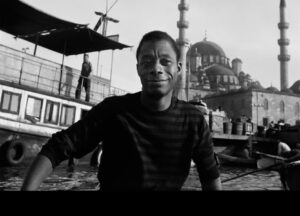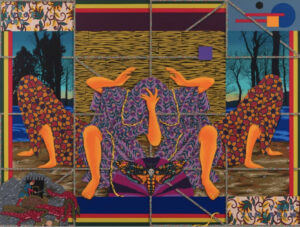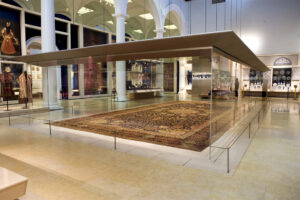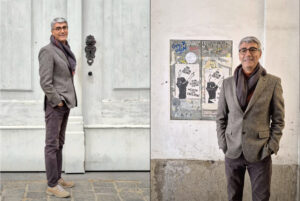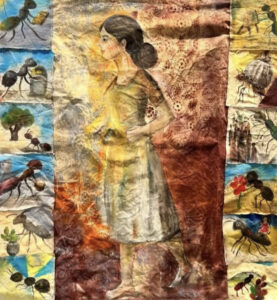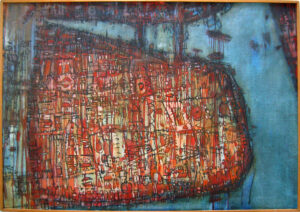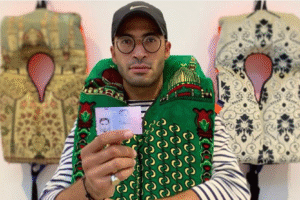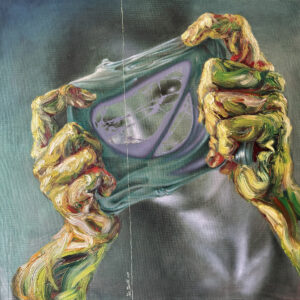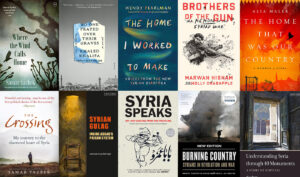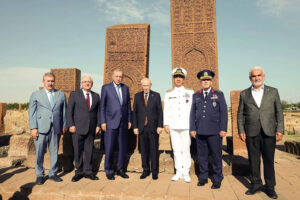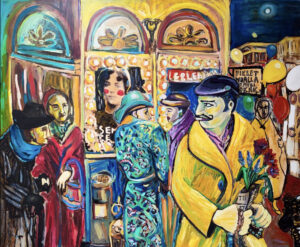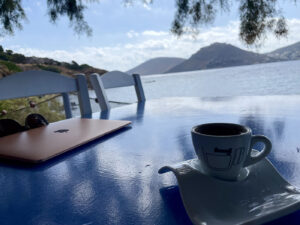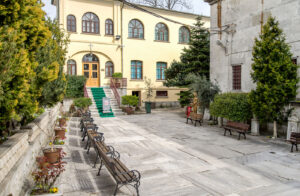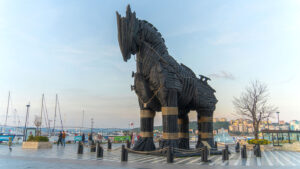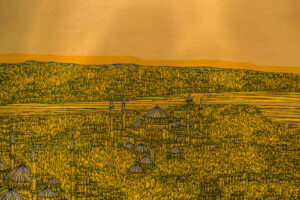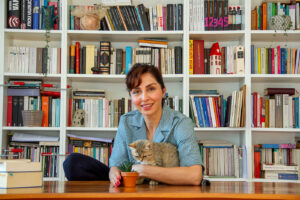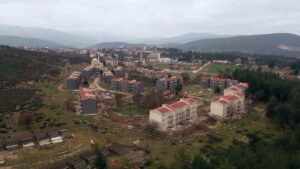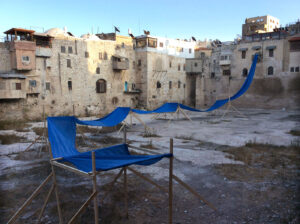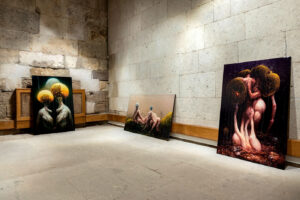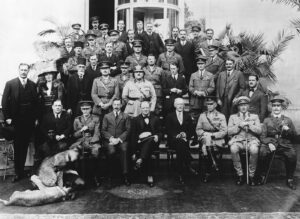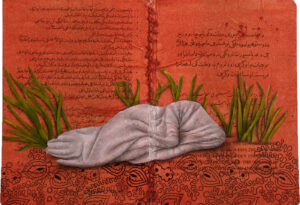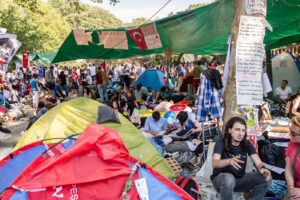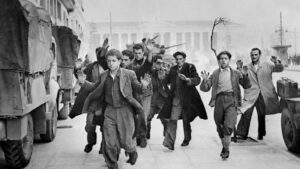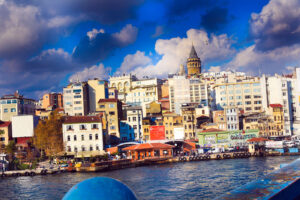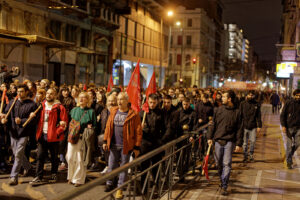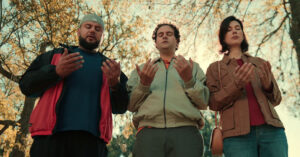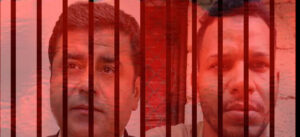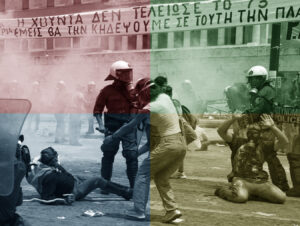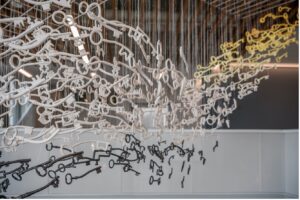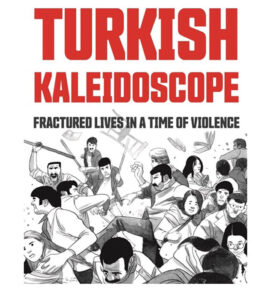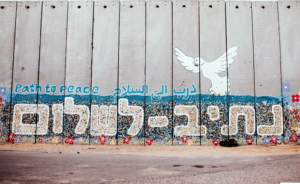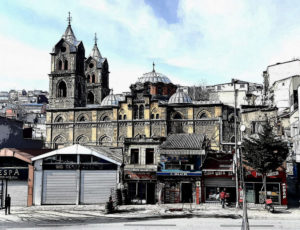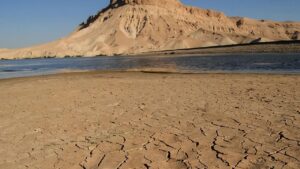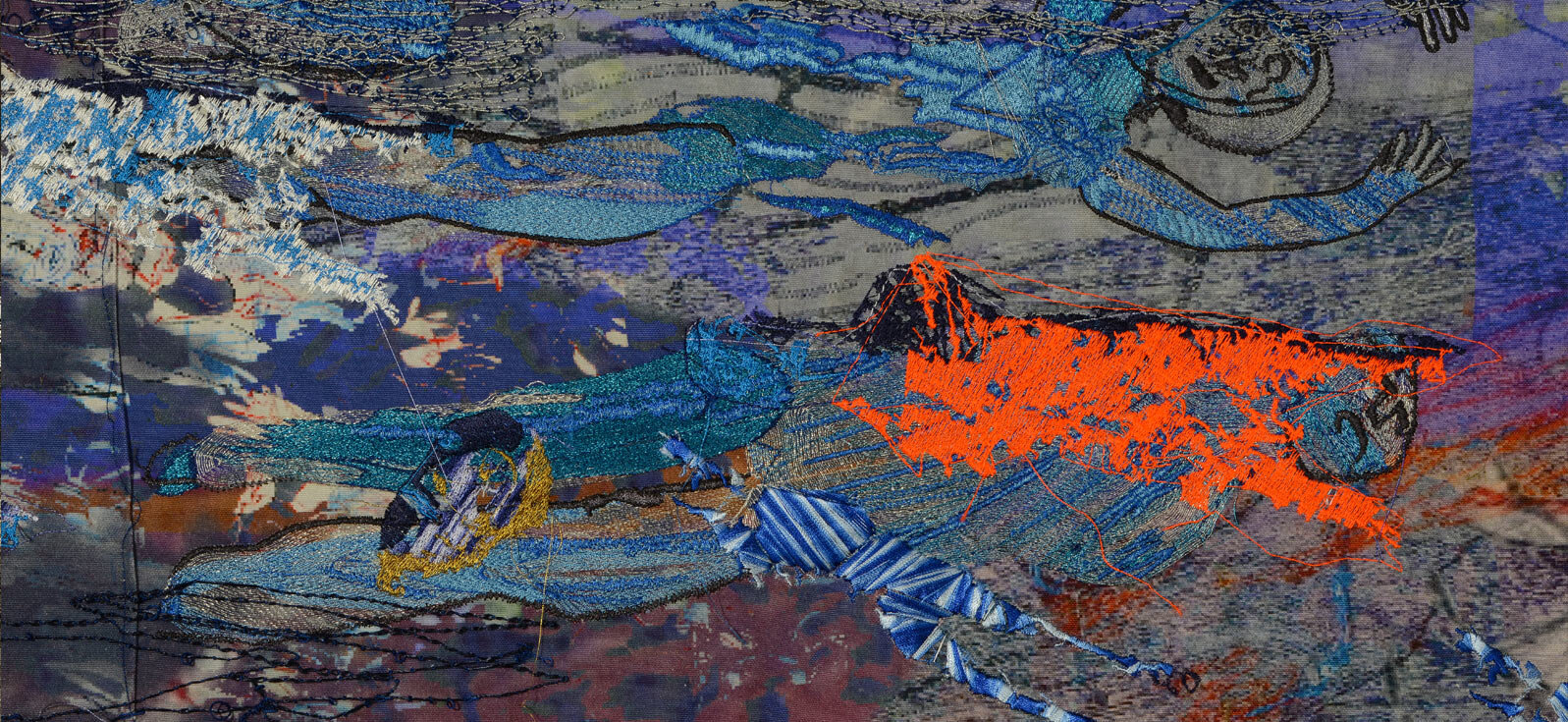
“Untitled” by Alice Kettle (courtesy of artist Alice Kettle).
a story by Aida Y. Haddad
The rocky path is worn smooth by the tread of feet leading to a sandy shore that continues to the sea. The narrow beach is hidden from sight by huge rocks. It is crowded with people carrying light luggage, as if they were not going on a journey never to return.
He watches her closely. His gaze does not waver for a moment; he knows that a moment is all it takes to lose everything… The child knows he’s there. He is always there. She runs on the beach, amazed at how her feet leave an imprint in the sand. She picks scattered shells that come from an enchanted world at the bottom of the sea, choosing the most beautiful to decorate the palace she builds in the sand, the palace of the nymph.
He wishes his heart were made of stone. He turns toward his wife and her mother who are sitting in the shade of a tree. Coming early was a good idea; the new arrivals could not find a tree to shelter from the hot noon sun. His heart aches for his family. He swallows his tears and smiles at his daughter, who is focused on playing with the sand, building here and digging there, all the while telling herself stories, as is her wont. He wishes that at the age of seven she were less beautiful, so that maybe his fear would be allayed. Her orange hair bright as the sun when it hugs the horizon, the blue of the sea reflected in her eyes, and sometimes, when her eyes gleam joyfully, the green of a coastal pool… What homeland is this that lets wolves take away the childhood of its children?
“Hiba, take only one toy, darling, we cannot carry much luggage.”
“I’ll take my Barbie doll and her daughter because I can’t leave the child at home alone.”
“No, darling, we can’t…take them both.”
The journey is long, and the worst has not yet come, like meeting people he did not want to get to know. He can no longer dream. All he wants is to wake up from this nightmare.
Hiba runs to him.
“Shall we board the big ship tonight, Baba?”
“No, habibti, we’ll take a rubber boat, and we will be with all these people whom you see here, and that’s why you must stay close, between your mother and me, your hand in my hand throughout the journey.”
“And will the nymph come with us?”
“What nymph, habibti?”
“My friend — I play with her down by the sea.”
“I don’t know, maybe she will swim along with us.”
“Will we reach a beautiful harbor and there will be no war?”
“No, Hiba, no wars there, the fighting is all in our country.”
He cannot shake off his thoughts: The record of their victories is the number of our dead. And what does it matter who loses the war and who wins it? The quicksand took over our homeland, swallowing everything. The swamps assassinated our trees. No one protects people like us back home, but will exile be more merciful?
Fear, that they will be repelled by unfamiliar harbors. The stories that people tell abound about the sea, where the bodies of forever-lost migrants are piled up, about fenced ports, about what could happen to them even if they arrived safely. Another unknown and grueling start.
The salt is in my mouth, in my tears, the mother thinks as she walks towards her child.
“Hiba, can I play with you?”
“Of course, Mama. The nymph and I need a lot of help to build the palace before the ship sails at night.”
“You have a new nymph friend?”
“Yes!”
“And how can I help you two?”
“Dig in the sand with us, Mama, and tell me the story of the nymphs living in a palace under the seas.”
“I told you that story a thousand times.”
“Please, Mama, this nymph has never heard it the way you tell it before.”
The freedom of her feet while immersed in the sand reminds her of a joy that she has no energy for now. Fear kills her heart. She dreams of her home, with everything she left behind. They will sail after dark to get to a safe haven in Greece, in Italy, she doesn’t know. And this rubber boat inflated by the sailors (you think of them as sailors, not smugglers, so you don’t get too scared) has become a rock that crushes her heart.
“I’ll go see your father and grandmother and come back.”
She walks towards her husband dusting off these thoughts so that he does not sense the horror that nests in every cell of her body.
“Come, love, sit by me.”
His puts his arm around her and feels her body shiver.
“Not now, Walid, look at these people around us.”
“What do they want from us? You are my love.”
But he knows what she means. He sees how their eyes hunt her when she walks by.
Feeling the heat of her body, he dreams of a place where they will be alone together.
“It’s better not to leave your mother alone anymore.”
“Looks like she’s asleep. I’ll go in a minute, don’t worry.”
“They insisted that I come with them,” the grandmother recalls. The ache in her arm and chest increases, as she closes her eyes and wishes she could sleep for centuries.
“You can’t stay alone.”
She doesn’t tell them that she wouldn’t be alone, that the ghosts they do not see will accompany her.
“I’ll be a burden on you. Let me stay home.”
And she does not add: “with my faded memories of a love torn by brutality.”
“Emigrate, my son, with your family; your life stretches out before you.”
“We leave together or stay together.”
She does not say, “This body I drag is heavy, and my sanctuary is the invisible part of me, in which I store the images of those I loved.”
She cannot breathe and the pain in her chest increases. She wants to call out to her son, but can’t. She sees her body lying under the tree, and next to her a nymph. The nymph tells her gently: “I can’t forget a rubber boat that I saw lurching between the waves; I kept circling around it when I saw a three-year-old child, wearing a red shirt, fall into the sea. I swam with him to the beach, hoping he could get his breath back. The image of this migrant child, alone in his death, was published in newspapers around the world*. Don’t worry about your family, I’ll be with them until they reach the harbor safely.”
The grandmother smiles as she becomes aware of what is happening.
Walid gets up to check on his mother. She has no pulse. Her eyes are open in amazement, and her smile lights up her face. How can you leave me so quickly, Mom?
“Is there a doctor here, please help me.”
Time passes slowly, a doctor confirms that she is dead. He asks his wife to stay with Hiba so that she does not see her grandmother. He needs to think. One of the sailors told him that he would take care of the matter, and move the body to a nearby burial ground, in return for some money. Does he leave it to them and not attend his mother’s burial? Or do they all go back to a city under bombardment? He sold everything he had to get the money he needed to pay for the trip. Does he let them travel without him?
One of the navigators calls out to the passengers to get ready. Walid shuffles towards his family. After a day playing on the beach, Hiba looks tired. He looks at his wife’s stunned face, avoiding her gaze because he has nothing to say to her. She wants him to make a decision because she can’t, but he is used to saying nothing. Does he pretend to believe them so that he can leave his mother to them, knowing that he cannot believe them? He holds Hiba’s hand tightly, afraid she will get away from him, as if able to protect his family from the brutality of people.
His daughter squeezed his hand: “It’s okay, Baba, don’t be afraid.”
How did she feel his hesitation? He does not ask: “When did you grow up, my daughter?”
“My fear is only for you, my love,” he says.
“The j
ourney is hard, but I learned to be strong from you. And we will arrive safely, do not worry.”
“Of course we will, but how do you know?”
“My grandmother told me that the nymph promised her that she would be with us to make sure we arrive safely.”
“Your grandmother? When?”
“Now.”
This is her will; he now understood that she wanted to stay. He runs to the sailor and says, “That’s all that’s left in my pocket, take it, and make sure my mother is buried in a place where I will be able to find her when I come back.”
“Don’t worry, I will. I will take enough money from you to cover burial costs, and I’ll attend the funeral… because of her face. My mother’s face looked just like that, though she died young.”
The boat sails, and Walid’s gaze is fixed on the shore. He cannot grieve for his mother. There are no paths in the sea, only the froth floating on the surface of the water. The tide will soon erase their footprints on the sand.
Walid felt like his life had been wasted. He had tried all the gods, was drained of all prayers. Would the pain abate if he, too, surrenders to the nymph to whom his mother and daughter resorted?
On this path of foam, the nymph and the stories she inspired was all that was left.
منزل خلف بحر لازوردي
كتبت القصة عايدة يعقوب حداد وترجمتها ميشكا مجبّر موراني الى الانكليزية
بدأت تلك البقعة الصغيرة التي تخفيها عن عيون الذين لا علم لهم بها صخور ضخمة، تمتلىء بالناس وقد خفَ حملهم وكأنهم غير قادمين على رحلة لا عودة قريبة منها. ويفاجئ الناظر حين يتسلق احدى الصخور التي تآكل سطحها من كثرة الاقدام العابرة، ويشرف على هذه البقعة، هذا النسيج الرملي الذي يتواصل والبحر…
يراقبها عن كثب لا يغيب نظره عنها لحظة لأن اللحظة قد تأخذ منه كل شيء… تعرف الطفلة أنه هناك.. هو دائما هناك… تركض على الشاطئ يذهلها كيف تنطبع قدماها في الرمال، تلملم الأصداف المتناثرة الآتية من عالم مسحور في قاع البحار، تختار أجملها لتزيّن بها القصر الذي تبنيه في الرمال، قصر الحورية…
ليت القلب حجر.. يلتفت خلفه حيث جلست زوجته ووالدته في فيء شجرة …. مجيئهم باكرا كان خيارا جيدا، اذ أن القادمين الجدد لا يجدون فيء شجرة ترد عنهم حرارة الشمس عند الظهيرة. . يخفق القلب لهما، يبتلع الدمع ويبتسم لابنته وهي منهمكة في اللعب بالرمال، تبني هنا وتحفر هناك ويعرف أنها تؤلف الحكايات… يتمنى وقد بلغت السابعة لو كان جمالها أقل، ربما كان خوفه أقل.. شعر برتقالي صاخب كلون الشمس لحظة تعانق الأفق، وزرقة البحر تنعكس في عينيها، وأحيانا، حين تلتمع عيناها فرحا، خضرة شاطئه… أي وطن هذا الذي يترك الذئاب تسلب طفولة أولاده؟
“”هبة، خذي لعبة واحدة فقط يا حبيبتي، لا نستطيع أن نحمل متاعا كثيرا.”
“سآخذ دميتي باربي وابنتها لأني لا أستطيع أن أترك ابنتها في البيت وحدها.”
“لا يا حبيبتي، لا نستطيع…خذيهما معا.”
الرحلة طويلة وأسوأها لم يبدأ بعد، تعرف خلالها على أناس لم يكن يريد أن يتعرف عليهم.. ما عاد بامكانه أن يحلم … كل ما يريده أن يستفيق من هذا الكابوس…
تركض نحوه:
“هل نركب الباخرة الكبيرة الليلة يا أبي؟”
“لا يا حبيبتي، سنأخذ قاربا مطاطيا، وسنكون مع كل هؤلاء الناس الذين ترينهم هنا، ولهذا يجب أن تبقي قربي، بين أمك وبيني، يدك في يدي، طيلة الرحلة.”
“وهل ستأتي الحورية معنا؟”
“أية حورية يا حبيبتي؟”
“صديقتي التي ألعب معها في البحر.”
“لا أعرف، ربما تسبح معنا.”
“وهل نصل الى مرفأ جميل ولن تكون هناك حرب؟”
“لا يا هبة، لا حروب هناك، الجميع يتقاتلون في بلادنا.”
تطارده أفكاره لا يعرف كيف يردها: يسجّلون انتصاراتهم بعدد موتانا . وماذا يهم من يخسر الحرب ومن يربحها؟ الرمال المتحركة اندلعت في الوطن واغتالت المستنقعات الأشجار. لا أحد يحمي أمثاله في الوطن، فهل تكون الغربة أكثر رحمة؟.. الخوف رغم كل هذا أن تصدهم المرافئ الغريبة.. القصص التي يرددها الناس كثيرة عن البحر الذي تكدّست فيه جثث مهاجرين ضاعوا للأبد، عن الموانئ المسيّجة، عن الجدران، عما يمكن أن يحدث لهم حتى لو وصلوا… بداية أخرى مجهولة وشاقة.
“الملح في فمي، في دموعي”.. تفكر الأم وهي تمشي نحو طفلتها..
“هبة، هل أستطيع أن ألعب معك؟”
“طبعا يا ماما، الحورية وأنا نحتاج لكثير من المساعدة لنبني القصر قبل اقلاع الباخرة في الليل”..
” الحورية صديقتك الجديدة؟”
“نعم.”
“تمام. وكيف أساعدك أنت والحورية؟”
“أحفري في الرمال معنا يا ماما، وخبريني قصة الحورية التي تعيش في قصر تحت البحار.”
“أخبرتك تلك القصة الف مرة.”
“أرجوك يا ماما، الحورية لم تسمعها بالطريقة التي تروينها من قبل.”
حرية قدميها حين تنغرسان في الرمال تذكرها بفرح لا طاقة لها عليه الآن. الخوف يقتات قلبها. تحلم ببيتها، بكل ما تركته وراءها. سيبحرون بعد ساعات، في الظلام، للوصول الى شاطئ آمن في اليونان، في ايطاليا، لا تعرف.. وهذا القارب المطاطي الذي نفخه الملاحون (تفكر بهم كملاحين حتى لا تخاف أكثر) صار صخرة تسحق قلبها.
“سأذهب لأرى أباك وجدتك وأعود بعد قليل.”
تمضي نحو زوجها تنفض غبار هذه الأفكار حتى لا يحدس هذا الرعب الذي يعشش في كل خلية في جسدها.
“تعالي يا حبيبتي، اجلسي قربي.”
تضمها ذراعه. يشعر بجسدها يرتعش بين يديه.
“ليس الآن يا وليد، انظر الى أشكال هؤلاء الناس حولنا.”
“ماذا يريدون منا؟ أنت حبيبتي”..
ولكنه يعرف ما تقصد،
يرى كيف تصطادها العيون حين تمشي…
يشعر بحرارة جسدها، يحلم أن يضمهما مكان وحيدين معا…
“من الأفضل ألا أترك أمك وحدها أكثر.”
“يبدو لي انها نائمة.. سأذهب اليها بعد قليل، لا تقلقي” ..
أصروا أن آتي معهم، تفكر الجدة. يزداد الوجع في ذراعها وصدرها، تغلق عينيها تتمنى لو تنام دهورا:
“لا يمكن أن تبقي وحيدة”..
ولا تقول لهم أنها لن تكون وحيدة، وأن أشباحا لا يرونها ترافقها.
“سأكون عالة عليكم، دعوني أبقى في البيت.”
ولا تضيف: “مع ذكريات باهتة عن محبة مزّقتها الوحشية.”
“هاجر يا ابني مع عائلتك فالحياة تمتد أمامكم.”
“نغادر معا أو نبقى معا.”
لا تقول: “هذا الجسد الذي أجرجره ثقيل وملاذي هذا الجزء اللا مرئي في داخلي الذي أختزن فيه صور من أحببت.”
أنفاسها تضيق، الوجع في صدرها يزداد، تريد أن تنادي على ابنها فلا تستطيع. ترى جسدها مستلقيا تحت الشجرة وبجانبها حورية. تقول لها الحورية بلطف: ” لا يمكن أن أنسى قاربا مطاطيا رأيته يترنح بين الأمواج، بقيت أدور حوله حين شاهدت طفلا لا يتجاوز الثالثة، يرتدي قميصا أحمر يسقط في البحر.. سبحت به الى الشاطئ لعله يسترد أنفاسه. صورة هذا الطفل المهاجر، وحيدا في موته، نشرتها الجرائد حول العالم.[1] لا تقلقي عليهم، سأكون معهم حتى يصلوا مرفأ آمنا.”
تبتسم الجدة مدركة ما يحدث….
ينهض وليد يتقفد الجدة… يدها لا نبض فيها، عيناها مفتوحتان بدهشة وابتسامتها تملآ وجهها.. كيف يا أمي تتركيني بهذه السرعة. “هل من طبيب هنا، أرجوكم ساعدوني.”
يمر الوقت بطيئا، يؤكد طبيب أنها فارقت الحياة… يطلب من زوجته أن تبقى مع هبة حتى لا ترى جدتها…حتى يفكر… قال له أحد الملاحين أنه سيتولى الأمر وينقلها الى مدفن قريب مقابل بعض المال.. هل يتركها لهم ولا يحضر مراسيم دفن أمه؟ أم يعودون جميعا بها الى مدينة تحت القصف؟ وكيف يعود وقد باع كل ما يملك ليحصل على المال الذي يحتاجه لدفع ثمن الرحلة. أيتركهم يسافرون بدونه؟
يصرخ احد الملاحين بالركاب أن يستعدوا. يجرجر الأب قدميه نحو عائلته. تبدو هبة متعبة بعد نهار من اللعب على الشاطىء، ينظر الى وجه زوجته المذهول، لا يقابل نظراتها لأنه لا يملك أن يقول لها شيئا. تريده أن يأخذ قرارا ولكنه تعوّد أن يصمت…. هل يدعي انه يصدقهم حتى يستطيع أن يتركها لهم، وهو يعلم أنه لا يستطيع أن يصدقهم؟. يشد على يد هبة خائفا أن تفلت منه، وكأنه قادر على حماية عائلته من وحشية الناس…
“تشدّ ابنته على يده: “لا بأس يا أبي، لا تخف.”
كيف شعرت بتردده؟ لا يسألها: متى كبرت يا ابنتي؟
يقول: “خوفي عليكم فقط يا حبيبتي.”
“الرحلة شاقة ولكني تعلمت القوة منك.. وسنصل، لا تقلق.”
“طبعا سنصل، كيف عرفت؟”
“”قالت لي جدتي أن الحورية وعدتها بأنها ستكون معنا حتى تتأكد من وصولنا.”
“جدتك؟ متى؟”
“الآن.”
هذا ما أرادت … يرضخ لمشيئتها أخيرا… يركض نحو الملاح يقول: “هذا كل ما بقي في جيبي، خذه، وتأكد من أنها ستدفن في مكان سأجدها فيه حين أعود.”
“لا تخف، سأفعل. سآخذ منك ما يكفي ليغطي تكاليف الدفن، وسأحضر جنازتها لأن وجهها يشبه وجه أمي رغم أنها كانت شابّة حين ماتت.”
يبحر القارب ونظر وليد معلق بالشاطىء لا يملك أن يبكي أمه.. لا طريق مرسومة في البحر غير زبد يطفو على وجه الماء، وبعد قليل سيمحو المد آثار أقدامهم على الرمال.
ضاع العمر سدى في مكان ضائع… جرب كل الآلهة، استنزف كل الصلوات، أترى يخف هذا الوجع لو استسلم لوجود آخر؟
على درب من رمل وزبد، الحورية والقصص التي أوحت بها، هي كل ما تبقى لهم..
1 آلان كردي (أيلان شنو) طفل سوري من أصل كردي في الثالثة من عمره، تداولت الصحف العالمية صورته بعد أن وجد ميتا على الرمال اثر غرقه في البحر المتوسط يوم 2 سبتمبر 2015.
Translated from the Arabic by Mishka Mojabber Mourani, an educator and writer who lives in Beirut. Mourani is the author of Balconies: A Mediterranean Memoir and a number of poems and short stories in print and online literary magazines. She writes in English and in French.
* Alan Kurdi (Alan Shenu) was a three-year-old Syrian child of Kurdish heritage who was found drowned, along with his mother and brother, on a beach on the Turkish coast on September 2, 2015.



